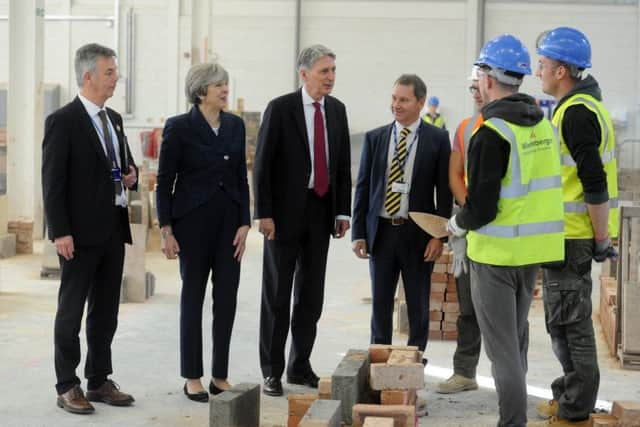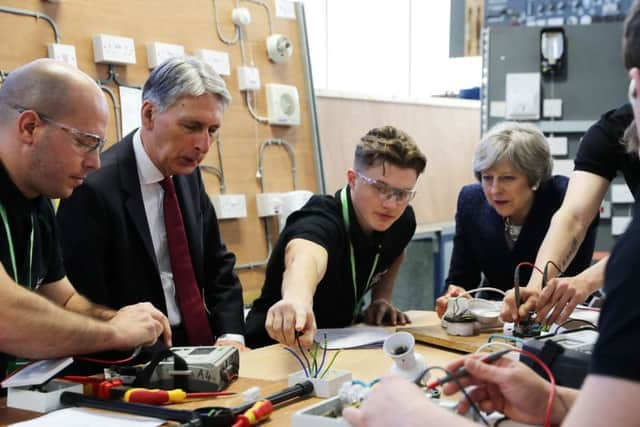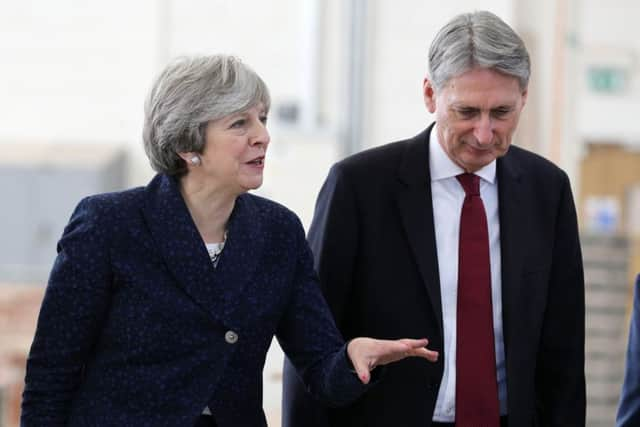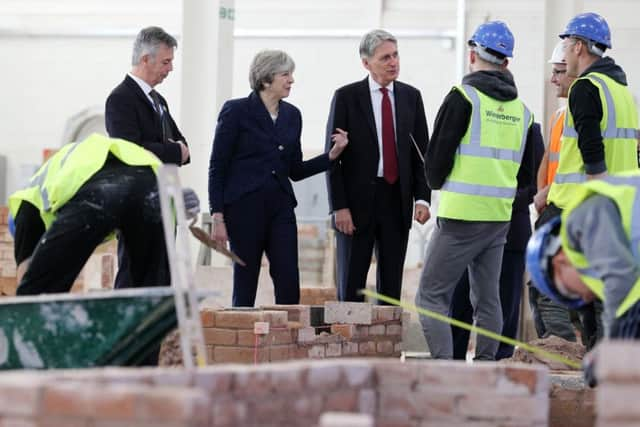Budget 2017: Hammond and May put on united front on visit to Leeds College of Building
Mr Hammond was joined by Theresa May in Leeds this morning as the pair toured a city building college, putting on a united front amid claims of a rift over their approach to Brexit.
In his Budget speech yesterday, the Chancellor promised to back the Northern Powerhouse project to boost the region’s economy with the help of a £1.7bn Transforming Cities Fund to boost local transport projects.
Advertisement
Hide AdAdvertisement
Hide AdBut he was accused of “behaving like Santa Claus with special prizes for well-behaved cities” after revealing that half the fund would go areas with metro mayors, meaning Yorkshire cities will have to compete for the remaining money in the absence of a devolution deal for the region.


Talking to The Yorkshire Post at Leeds College of Building, the Chancellor denied he was punishing the region for failing to agree a devolution deal.
He said: “Half of this fund will go to the combined authorities with metro mayors and the other half will go for other cities in England to bid for. That is a sizeable chunk of money, £850m, available for other English cities to bid for.
“The point of organising these competitions is to encourage people to come forward with very high value projects and that is what typically happens. We award the money according to the quality of the project and the money it delivers.
Advertisement
Hide AdAdvertisement
Hide Ad“So a project that delivers good benefits for reasonable costs is going to stand more chance of winning an award than one that does the opposite.


“The challenge lies with the cities to come up with really good projects that deliver really good value for people in the region.”
Among his announcements yesterday was that £30m will be spent on trials to improve mobile and digital connectivity on the TransPennine route between Manchester and Yorkshire.
Asked whether he ought to be prioritising the proposed Northern Powerhouse Rail line connecting Liverpool and Manchester with Leeds, Sheffield and Hull, he said: “These are separate issues and I completely recognise the capacity problems, but I’m afraid I have heard people complaining about WiFi connectivity.
Advertisement
Hide AdAdvertisement
Hide Ad“This is a pilot to test new technology, if it is successful it will eventually be rolled out across the network. We have chosen TransPennine as the route to test it on, bringing the benefits of this higher connectivity first to TransPennine.


“There is a broader challenge with the TransPennine route, as you know Network Rail are producing a feasibility study on the best ways to enhance the TransPennine route, improve journey times and increase reliability between Leeds and Manchester and that is a core part of the Northern Powerhouse rail project for us.”
During the Leeds College of Building visit, Mr Hammond and Mrs May spoke to students in the electrical workshop and others doing bricklaying.
The Prime Minister said: “We need to build more homes. That’s why we’re putting more financial support into the housing market, that’s why we’re going to ensure councils can build council homes, why we’re going to ensure that there’s land supply available to build those homes and that we have the bricklayers, the electricians, the roofers that we need for the future.
Advertisement
Hide AdAdvertisement
Hide Ad“That’s why it’s so good to see at Leeds College of Building those skills being taught to a generation so that they go out and built the homes we need.”


Earlier, Mr Hammond insisted his flagship Budget tax cut to assist first-time buyers would help a million people get on the housing ladder.
The Chancellor dismissed criticism of the policy from the Office for Budget Responsibility, saying the Budget watchdog had not taken into account measures to increase the number of new homes being built when it said that abolishing stamp duty on the first £300,000 of a first-time purchase would simply push up prices.
After the OBR downgraded growth forecasts due to poor productivity performance, Mr Hammond said the challenge for the nation was to “prove them wrong”.
Advertisement
Hide AdAdvertisement
Hide AdThe Chancellor’s stamp duty policy was part of a giveaway package which pumped an additional £25 billion into priorities such as housing, infrastructure and the NHS.
But the OBR took the shine off the move by predicting it would push up prices by around 0.3% - meaning many first-time buyers would have to pay more than they otherwise would while the main gainers would be people who already owned a property.
It also suggested that only around 3,500 additional homes would be sold as a result of the incentive.


But Mr Hammond said: “Hopefully, by abolishing stamp duty, which will save the average first-time buyer about £1,700, that will be a help and an incentive to focus on getting the deposit together, getting the money together to get on the housing ladder, and we hope that many more young people will be able to get on the housing ladder.”
Advertisement
Hide AdAdvertisement
Hide AdHe told the BBC: “The OBR looked at a particular narrow question - if you reduce stamp duty and don’t do anything else what would happen?
“But we have not done ‘nothing else’, we have introduced a very big package, £15 billion of extra money going in on top of the billions we are already spending on housing to increase the number of houses that we build in this country.
“So that’s not the situation we will have. We will have many more homes available.
“The important thing is that over the next five years, over the life of this parliament, a million first-time buyers will make an average saving of just under £1,700 when they buy their first home.
“I think that’s a good news story.”